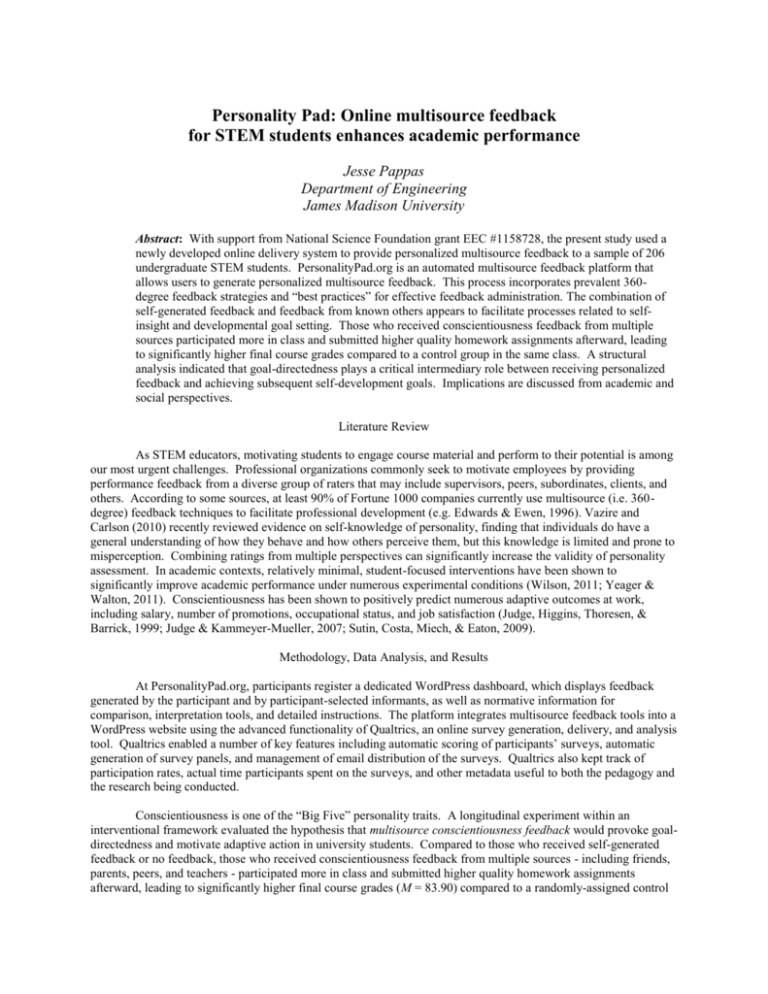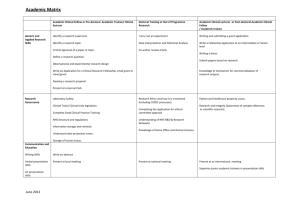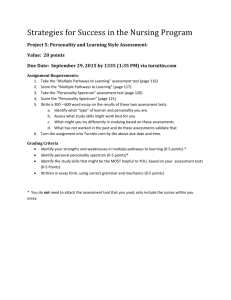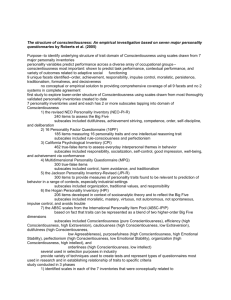2-page proposal file
advertisement

Personality Pad: Online multisource feedback for STEM students enhances academic performance Jesse Pappas Department of Engineering James Madison University Abstract: With support from National Science Foundation grant EEC #1158728, the present study used a newly developed online delivery system to provide personalized multisource feedback to a sample of 206 undergraduate STEM students. PersonalityPad.org is an automated multisource feedback platform that allows users to generate personalized multisource feedback. This process incorporates prevalent 360degree feedback strategies and “best practices” for effective feedback administration. The combination of self-generated feedback and feedback from known others appears to facilitate processes related to selfinsight and developmental goal setting. Those who received conscientiousness feedback from multiple sources participated more in class and submitted higher quality homework assignments afterward, leading to significantly higher final course grades compared to a control group in the same class. A structural analysis indicated that goal-directedness plays a critical intermediary role between receiving personalized feedback and achieving subsequent self-development goals. Implications are discussed from academic and social perspectives. Literature Review As STEM educators, motivating students to engage course material and perform to their potential is among our most urgent challenges. Professional organizations commonly seek to motivate employees by providing performance feedback from a diverse group of raters that may include supervisors, peers, subordinates, clients, and others. According to some sources, at least 90% of Fortune 1000 companies currently use multisource (i.e. 360degree) feedback techniques to facilitate professional development (e.g. Edwards & Ewen, 1996). Vazire and Carlson (2010) recently reviewed evidence on self-knowledge of personality, finding that individuals do have a general understanding of how they behave and how others perceive them, but this knowledge is limited and prone to misperception. Combining ratings from multiple perspectives can significantly increase the validity of personality assessment. In academic contexts, relatively minimal, student-focused interventions have been shown to significantly improve academic performance under numerous experimental conditions (Wilson, 2011; Yeager & Walton, 2011). Conscientiousness has been shown to positively predict numerous adaptive outcomes at work, including salary, number of promotions, occupational status, and job satisfaction (Judge, Higgins, Thoresen, & Barrick, 1999; Judge & Kammeyer-Mueller, 2007; Sutin, Costa, Miech, & Eaton, 2009). Methodology, Data Analysis, and Results At PersonalityPad.org, participants register a dedicated WordPress dashboard, which displays feedback generated by the participant and by participant-selected informants, as well as normative information for comparison, interpretation tools, and detailed instructions. The platform integrates multisource feedback tools into a WordPress website using the advanced functionality of Qualtrics, an online survey generation, delivery, and analysis tool. Qualtrics enabled a number of key features including automatic scoring of participants’ surveys, automatic generation of survey panels, and management of email distribution of the surveys. Qualtrics also kept track of participation rates, actual time participants spent on the surveys, and other metadata useful to both the pedagogy and the research being conducted. Conscientiousness is one of the “Big Five” personality traits. A longitudinal experiment within an interventional framework evaluated the hypothesis that multisource conscientiousness feedback would provoke goaldirectedness and motivate adaptive action in university students. Compared to those who received self-generated feedback or no feedback, those who received conscientiousness feedback from multiple sources - including friends, parents, peers, and teachers - participated more in class and submitted higher quality homework assignments afterward, leading to significantly higher final course grades (M = 83.90) compared to a randomly-assigned control group in the same class (M = 78.79). A structural analysis of relationships among key variables indicates that postintervention goal-directedness plays a critical intermediary role between receiving personalized feedback and achieving subsequent self-development goals. Discussion / Conclusion Bollich, Johannet, and Vazire (2011) recently published a unique hypothesis, that explicit personality feedback from close others could serve as a valuable self-development tool. Smither, London, and Reilly (2005) published a theoretical model of improvement following multisource feedback. The current study provided some evidence for both these propositions; for instance, final course grades were significantly higher in the 360-degree feedback condition than in the control condition. One uniquely promising aspect of feedback as a route to selfknowledge is that, unlike the intrapersonal routes to self-knowledge, feedback actually gives the person new information to consider. If a person is confronted with repeated feedback from trusted sources, and if the recipient is appropriately prepared for the information, knowledge and motivation may be gained that would not have been possible through self-guided efforts. Another essential element of self-development is the formation of an intentional developmental relationship with one’s self. One must practice self-control through benevolent selfgovernance stemming from a meta-cognitive awareness of one’s multiple identities, inner voices, social dynamics, and competing priorities. PersonalityPad.org combines open-source software with commercial web services to support an adaptable platform that can be used to assess personality, behavior, or performance in many personal, academic, and professional contexts. The current study provides evidence that such methodologies represent promising strategies for enhancing self-awareness, -assessment, and -development. Generally speaking, understanding and improving one’s self may be facilitated by personalized feedback from multiple external sources paired with opportunities to set and pursue personal goals. References Bollich, K., Johannet P., & Vazire, S. (2011). In search of our true selves: Feedback as a path to self-knowledge. Frontiers in Psychology,2,1-6. Edwards, M. R., & Ewen, A. J. (1996). 360° Feedback: The powerful new model for Employee Assessment & performance improvement. New York: AMACOM American Management Association. Judge, T. A., Higgins, C. A., Thoresen, C. J., & Barrick, M. R. (1999). The Big Five personality traits, general mental ability, and career success across the life span. Personnel Psychology, 52, 621-652. Judge, T. A., & Kammeyer-Mueller, J. D. (2007). Personality and career success. In H. P. Gunz & M. A. Peiperl (Eds.), Handbook of career studies (pp. 59-78). Thousand Oaks, CA: Sage. Smither, J.W., London, M., & Reilly, R.R. (2005). Does performance improve following multisource feedback? A theoretical model, meta-analysis and review of empirical findings. Personnel Psychology, 58, 33–66 Sutin, A. R., Costa, P.T., Miech, R., & Eaton, W. W. (2009). Personality and career success: Concurrent and longitudinal relations. European Journal of Personality, 23, 71-84. Vazire, S., & Carlson, E. N. (2010). Self-knowledge of personality: Do people know themselves? Social and Personality Psychology Compass, 4, 605-620. Wilson, T. D. (2011). Redirect: The Surprising New Science of Psychological Change. New York: Little, Brown, and Company. Yeager, D.S. & Walton, G. (2011). Social-psychological interventions in education: They’re not magic. Review of Educational Research, 81, 267-301.










